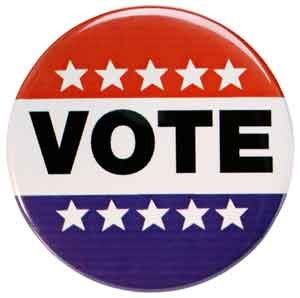
.
On my way to dropping off my 7th grader at the junior high this morning, he asked, out of the blue,
“Where do you get a yard sign for the election?”
He meant the “Vote for XX” signs that some of our neighbors have started decorating their front lawns with since a couple of months ago. Just so you know: So far I have not spotted a single sign for a democratic party candidate in our subdivision.
“Why?”
“Well, I want to vote for this guy ________ or maybe this guy _________, ah, I can’t remember his name, who was running for the senate [He’s not; the person my son was referring to is running for the Governor]. He has been a congressman [Correction: He’s a state senator] for a long time, and now he’s risking it all to run for this, this thing so that he can help the country. He’s risking it all to run for this. And I want to vote for him…”
“Wow. I am impressed. How do you know all about this? Did anybody come to school to talk to you? [They’d better not, of course!]”
“No. I just heard it from all the political ads on TV.”
Seriously? When did they watch so much TV? I am not bragging but we have PBS on in the morning and after school when my 7-year-old watches TV. The TV is seldom on when I am home after work or even on the weekends. How many political ads are run within a two-hour window during prime time?!?
“Well, you know, that’s the danger of watching and believing these ads: what if you’ve only seen the ads from one side and then you would have only heard the opinions from one side.” I gingerly prodded him in the right direction, I hope, as I cringed.
“I don’t like all of those ads attacking people; they picked up one word from somewhere and then they just totally blew it up and made it into a big deal. This guy, what’s his name, did not do that in his ad and I want to vote for him.”
So there you have it: He decided on his candidate by watching the ads on one night when we were drinking too much wine at a fundraising event. Although my son is only 12 years old, I believe the way he received information about the candidates (Promises only with no evidence to back them up. Punchline rules!) and how he decided WHOM to vote for is not that uncommon.
The modern elections are still run, largely, by air time. And this election is going to see the massive impact by the Supreme Court’s landmark ruling this January to allow corporations to spend unlimited funds to elect and defeat candidates.
Before the Supreme Court’s landmark campaign finance ruling in January, nonprofit groups…, able to accept unrestricted contributions from individuals and corporations, had been limited to broadcasting ‘issue ads’ and barred from ‘express advocacy,’ advertisements that directly urge voters to elect or defeat specific candidates.
Now… third-party groups in growing numbers have been flocking to this sharper form of messaging in the closing weeks of the campaign.
“Groups Push Legal Limits in Advertising”, 17 October 2010, New York Times
.
“Pedro offers you his protection.”
“Vote for me, and all your wildest dreams will come true.”
These campaign slogans still make me chuckle.
In the movie Napoleon Dynamite, the idea of uber-dork-100%-uncool Napoleon wowing the crowd with a surprise performance and thus helping his good friend Pedro win the class president election is rather endearing and satisfies our urge to root for the underdogs.
However, as I bit my lip to refrain from going into a tirade in the car, I questioned how scary it would be if this idea were to apply to real politics:
Let’s see who can put up the best show and have it run over and over again until repetition turns the message into the de facto fact because the alternative has been droned out.







